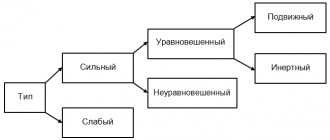Story
The theoretical basis for this type of testing is the concepts of extroversion and introversion. The author of the technique implied that these features of the central nervous system are genetically determined.
Methods for studying temperament existed before the advent of the Eysenck test; in particular, the first such questionnaire was proposed in 1947 . During testing, inconsistencies were discovered between the theoretical calculations of the author of the methodology and the testing data; Therefore, we had to resume the search for opportunities to determine the type of temperament using scales of neuroticism and extraversion - introversion.
The search for such possibilities culminated in the fact that in 1963 a technique was proposed, called a personality questionnaire and capable of diagnosing all the necessary parameters.
This technique is accessible and quite easy to interpret test results; it gives an idea of the level of self-esteem and emotional stability of the individual.
Interpretation of results
MPI
Extraversion:
- from 32 to 48 - “pure” extrovert
- from 16 to 32 - ambivalence, uncertainty
- from 0 to 16 - “pure” introvert
Neuroticism:
- from 32 to 48 - pronounced neuroticism
- from 16 to 32 - average score
- from 0 to 16 - emotional stability
Lie:
- more than 20 - absolute unreliability of the results
- from 16 to 20 - a dubious result
- from 5 to 15 points - reliable result
- 4 points or less - questionable result
EPI
Extraversion:
- over 19 - bright extrovert,
- over 15 - extrovert
- 12 - average value,
- less than 9 - introvert,
- less than 5 - deep introvert.
Neuroticism:
- more than 19 – very high level of neuroticism,
- more than 14 – high level of neuroticism,
- 9 - 13 - average value,
- less than 7 – low level of neuroticism.
Lie:
- more than 4 - insincerity in answers, which also indicates some demonstrative behavior and the subject’s focus on social approval,
- less than 4 is normal.
EPQ
Extraversion:
- more than 15 - “pure” extrovert
- from 7 to 15 - ambivalence, uncertainty
- from 0 to 6 - “pure” introvert
Neuroticism:
- more than 16 - pronounced neuroticism
- from 8 to 16 - average score
- from 0 to 7 - emotional stability
Psychoticism:
- more than 10 - working with people is contraindicated
- from 6 to 10 - there is a tendency towards emotional inadequacy
- from 0 to 5 - absent
Lie:
more than 10 - unreliable result
Classification of temperament types according to Eysenck
The Eysenck test reflects the connection between an individual’s two-phase personality model and a model reflecting the main four types of temperament: choleric, melancholic, sanguine and phlegmatic. This correspondence looks like this:
- A sanguine person ( corresponds to a stable extroverted titan according to Eysenck's classification) is able to adapt to new conditions in the shortest possible time. The emotional experiences of such a person are superficial, affects arise easily and often change. Needs a constant supply of “fresh” impressions and is restless. Sometimes undisciplined, both in everyday life and at work. Monotonous, long work causes severe discomfort and rejection.
- A choleric person (an unstable extrovert according to Eysenck) is easily excitable and impetuous in action. Movements are swift and energetic, affects are clearly expressed. Being carried away by work, they become more exhausted than necessary, because they spend too much energy on their actions. Hot-tempered, irritable, not always able to control his emotions.
- Phlegmatic (stable introvert according to Eysenck's typology) - new forms of behavior are developed slowly, but are very stable. They are slow and sedate in their actions, rarely lose their temper, and are not prone to affective reactions. He is persistent and persistent in his work, does not waste his energy, but approaches the task responsibly and thoroughly. In relationships, he is predictable, stable, and moderately sociable. Depending on the life situation, he will be either constant, thorough and self-possessed, or lethargic, indifferent, weak-willed, unemotional.
- A melancholic person (an unstable introvert in accordance with the same typology) has difficulty concentrating, feelings are deep and stable with weak expression. Intense emotions often cause an inhibition reaction (“give up”). Movements are often slow and speech is quiet. In communication he is shy, reserved, timid. In a calm state he can be a good worker. In an unfavorable situation, he becomes withdrawn, anxious, suspicious and fearful. They are prone to intense internal experiences, and often in circumstances that are not worth such attention.
Take the test now
Having passed the temperament test, your inner self will appear before you in a new light. You will determine what your character really is, and this will help you find the most successful path in your life. Knowing the temperament of your family and friends will help you feel calm with your family and surrounded by work colleagues.
Also, employers are increasingly offering to take a temperament test during the employment process to identify exactly the kind of future employee who will be able to better adapt and get along in the workforce.
Take the temperament test right now on our website! Thanks to saving test results and registration, you can always re-read the results and they will not be lost!
Description of scales
Neuroticism scale
Neuroticism is a phenomenon reflecting an imbalance in the processes of excitability and inhibition. At one extreme of the scale are people with high scores (with a high degree of excitability and instability); on the other hand, individuals are affectively stable.
This scale covers some aspects of personal self-regulation; the basis is emotional stability, expressed in the ability to adapt both in everyday conditions and in a stressful situation; as well as in the absence of severe anxiety and vegetative or neurosis-like states, self-doubt.
The maximum points on this scale do not always indicate the subject’s existing neurosis, but allow its development in the case of protracted stressful situations.
A person demonstrating a high level of neuroticism on this scale is highly likely to be effectively unstable, unconfident, impressionable, vulnerable, and capable of inappropriate reactions, especially in unusual situations. It is characterized by poor ability to adapt, a tendency to frequent mood swings, absent-mindedness, anxiety (often unfounded), impressionability, irritability, and impulsiveness. Such people are prone to the occurrence of neurosis in the presence of contributing factors.
An individual low in neuroticism is the exact opposite. He is distinguished by his clearly organized behavior, determination, and good ability to adapt both in ordinary, everyday and stressful situations; he has a clear inclination towards leadership.
Extraversion-Introversion Scale
- Extroversion is a quality that implies an orientation towards surrounding individuals, as well as interaction with them. A typical extrovert is sociable, impulsive, optimistic, focused on moving forward, and capable of taking risks; he has a fairly wide circle of acquaintances, he needs communication and new contacts. Prefers movement, dynamics; man of action. The feelings and emotions of such an individual are not subject to strict control. The typical extrovert is not the kind of person you can rely on. As a rule, in a number of situations there is a tendency towards aggressiveness.
- Introversion is characteristic of people who are turned “inward”, closed and reserved, detached from others (with the exception of a narrow circle of close people); An introvert is not inclined to take risky actions and prefers to approach any decision thoughtfully and thoroughly. He is able to keep impulsive manifestations under control; a pessimistic attitude prevails in the emotional background. In everyday life, a typical introvert is calm and shy. He plans his actions in advance and carefully considers them. He does not trust sudden impulses and impulses; he highly values moral character traits in people. The typical introvert is not easily angered and is predictable and non-aggressive.
This is interesting
Interesting fact! The studies that formed the basis of the future test were conducted on neurotic soldiers.
Extraversion
- Typical extrovert. Open and sociable, he feels the need to be in society, where he is highly active. Positive emotions predominate, control of feelings is reduced.
- Typical introvert. A closed person with little contact with people who prefers the inner world to the outside world. He loves introspection, which is why he is serious when making decisions, prefers not to take risks. The emotional background is directed towards the negative, but it is very difficult to anger an introvert.
Neuroticism
- Sustainability. Characterized by the ability to adapt to various changes, to achieve one’s goal without reacting to surrounding stimuli. Such a person rarely worries or fears the future. Characterized by reduced emotionality.
- Lability. Poor level of adaptation to change, as well as constant worry and fear. Expressed in rapid mood swings and poor control of feelings. It is easy to lead such a person astray from the intended path.
Eysenck test
The test taker is asked to answer 57 questions that simulate various life situations and are aimed at identifying the usual way of behavior for a given individual in these situations. The answer is “yes” or “no” (respectively “+” or “-” ), reflecting the first “natural” answer to each question that comes to mind.
This questionnaire also contains a kind of “safety net” - some of the indicators indicate insincerity in the answers, as well as some tendency towards demonstrative behavior. Such people are more focused on external approval than on introspection.
Interpretation of test results
When interpreting test results, a list of psychological characteristics is used, which are plotted on a coordinate system inscribed in a circle. The degree of expression of each personality trait is examined separately .
During the interpretation of the test results, the distance of the indicator value from the center of the circle is also assessed, since the degree of distance indicates the level of deviation of this parameter from the average value.
The author of the methodology believed that the strong and weak personality types identified by I.P. Pavlov are quite close in essence to the extroverted and introverted types of temperament.
Why is a temperament test needed?
In order to learn to understand yourself and people, determine the reasons for their behavior and actions, and sometimes even predict them, it is important to know what the human psyche is. In this sense, studying temperament helps a lot
As already mentioned, it is given from birth, does not change throughout life and is a combination of various properties of the nervous system. A person can more easily make a choice in favor of a profession, understand the actions of other people and establish relationships with them, and also better understand himself and his needs if he knows his temperament.
What the test will tell you
The Eysenck test will help you determine the stability of your nervous system, understand which of the properties is your main feature - introversion or extroversion; and will also reveal your level of conflict, a possible tendency to violate norms of behavior and asociality, and, if you look at it globally, a tendency to certain mental illnesses that are directly related to these qualities. Also, the PEN questionnaire can reveal your main type of temperament.
Theoretical basis
G. Eysenck, having analyzed the materials of a survey of 700 neurotic soldiers, came to the conclusion that the entire set of traits that describe a person can be represented through 2 main factors: extraversion (introversion) and neuroticism.
The first of these factors is biopolar and represents a characteristic of a person’s individual psychological make-up, the extreme poles of which correspond to the personality’s orientation either to the world of external objects (extraversion) or to the subjective inner world (introversion). It is generally accepted that extroverts are characterized by sociability, impulsiveness, behavioral flexibility, great initiative (but little persistence) and high social adaptability. Introverts, on the contrary, are characterized by unsociability, isolation, social passivity (with sufficient persistence), a tendency to introspection and difficulties in social adaptation.
The second factor - neuroticism (or neuroticism) - describes a certain property-state that characterizes a person in terms of emotional stability, anxiety, level of self-esteem and possible autonomic disorders. This factor is also bipolar and forms a scale, at one pole of which there are people characterized by extreme stability, maturity and excellent adaptation, and at the other - an extremely nervous, unstable and poorly adapted type. Most people are located between these poles, closer to the middle (according to the normal distribution).
The intersection of these 2 bipolar characteristics allows us to obtain an unexpected and rather interesting result - a fairly clear assignment of a person to one of the four 4 temperaments.
The third factor - psychoticism - was added in the fourth version of the questionnaire and is a characteristic of a tendency towards antisocial behavior and inadequacy of emotional reactions. This factor is not bipolar; its high values may indicate difficulty in social adaptation, although there is no clear justification for the legitimacy of identifying this category, and it is disputed by many foreign researchers.
What is temperament?
Temperament is one of the most important innate characteristics of every person. It is he who determines the level of activity, energy, rhythm of life and emotionality, thanks to which a person forms his daily routine, chooses a profession and builds relationships with other people. There are several different questionnaires to determine the type of temperament, developed by different scientists, but the Eysenck test is rightfully considered the most effective.
The temperament tests of many authors are basically highly simplified and abbreviated versions of his questionnaire, and are characterized by greater error.









